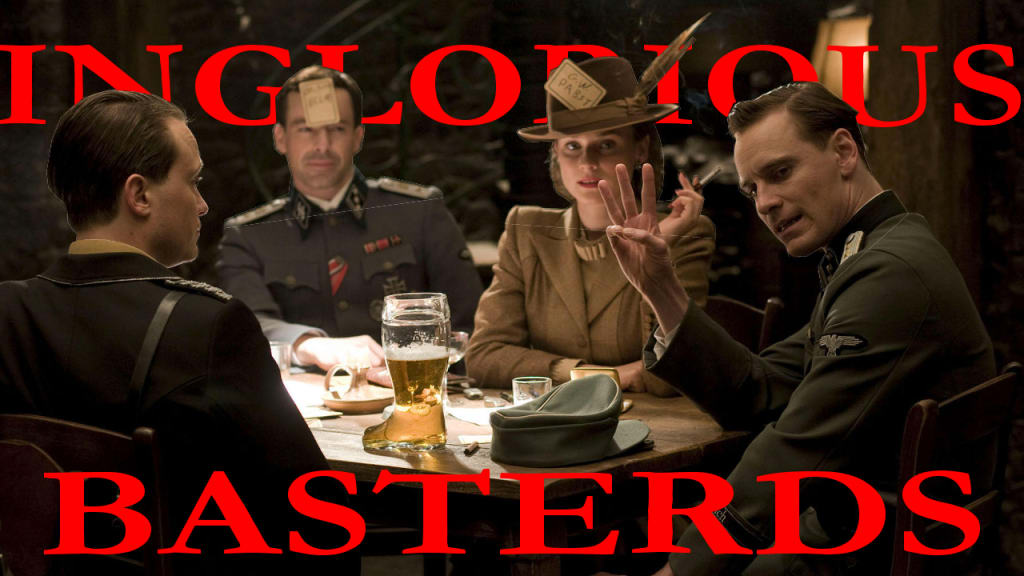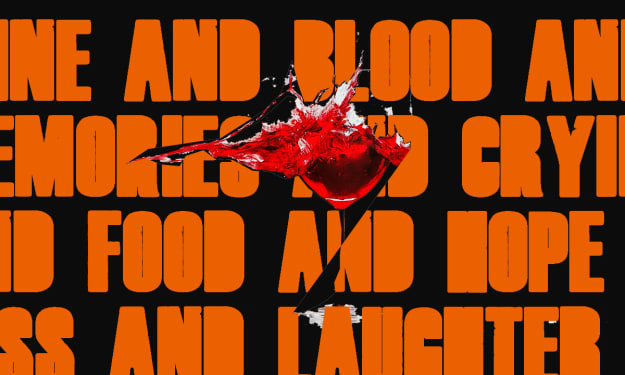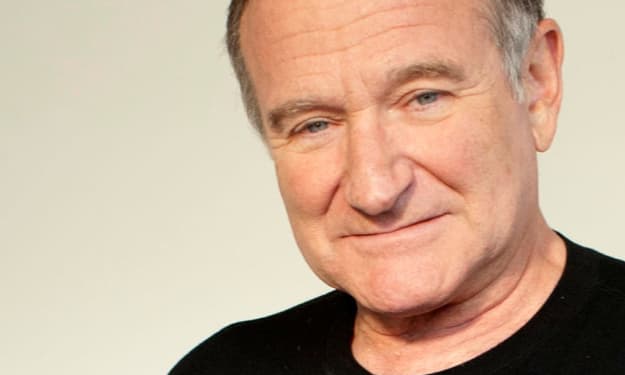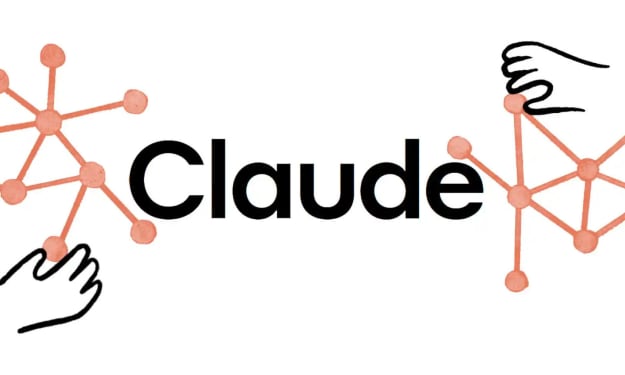Analysing my favourite scene from Inglorious Basterds
Analysing what makes the scene one of Tarantino's best, and how we can take lessons within our own writing.

Full spoilers ahead.
Tarantino's 2009 offering is an interesting case for long-term fans of his work. The usual format is there; whip-fast witticisms by characteristic and distinctive characters who lean in and out of the plot in adventures that could be stand-alone films in the hand of lesser directors, and a penchant for violence and unexpected death scenes. However, although its differences to the rest of the auteurs work are fairly surface-level, many people seemed rather alienated by the film when it was first released. There are many people out there who recognise it as a great film, but dismiss it as an average Tarantino film, which absolutely does not do it the justice it deserves.
Upon re-watching it for the fifth or sixth time, I found myself as enthralled as any other positive time watching it, and moreover, I found myself excited in a way I rarely am when I knew a particular part was coming up. It's engaging, fast and brutal, as are the rest of his films, but there's a confident polish to this particular film, as if the last twenty years of learning how to make films culminated into this amazing piece of cinema. It's a love-letter to his craft, and I'm sure there are more people like some of my friends who were weirded out by the sudden history-defying ending, but in retrospect, it represents a huge part of cinema that we were always forgetting. Sure, outside of conspiracy theories, perhaps Hitler wasn't riddled with machine-gun fire by two men pretending to be Italian film-makers in real life, but it makes sense to show something like that in film, because no-one else has rarely dared to do that. Some people try to make sense of it by stringing Tarantino's films together in a cinematic-universe, and I am all for that, but it shouldn't always be so necessary. Why can't we see, arguably, the greatest villain of the 20th century mowed down in blood-thirsty fashion? It's something the audience yearns to see, and if the entire film might be a love-letter to cinema in general, then this is the kiss on the envelope.
It's not so surprising then, that I would change my mind every few minutes when I decided which scene I would use as a basis for the article. Of course, perhaps the fantastic first scene, which glides by so fast and in such an elegant and terrifying flash, you might not even realise it is almost a half hour gone, as Christoph Waltz as Colonel Hans Landa is introduced to an entirely new international audience. Or perhaps when he and Shoshana meet four years after in a café, and is clearly trying to remember where he recognises her from, despite his courteous words. Or when he meets Diane Kruger as Bridgett VonHammersmark and her three Non-German escorts with only a small veil of courtesy over his suspicion. Or perhaps anything with Landa in it? No, as you might have guessed from the thumb-nail, I simply have to talk about my absolute favourite scene. An obvious choice perhaps, but true genius in a single scene cannot be overappreciated.
Set-Up
As with most of Tarantino's films, the pace can be described as erratic. The action is short, fast and frantic in his films, but it's the build-up that pays off, and although it is expertly crafted in the very beginning, here it is ramped up ten-fold, for several reasons.
First of all, let's talk about audience expectations. Whether you are a fan of the director's previous works or this is the first of his you have seen, the aforementioned introductory scene has displayed everything we need to know about the film. We know the antagonist is ruthless, cunning and incredibly charismatic, although he only represents a small piece of the enemy's machine. We know the dialogue is witty and elegant conversation, that moves rapidly from seemingly unrelated topics back to relevancy subtly. Lastly, we of course know that anything can happen, and no-one is safe in this war-time setting.
Now, we move to character expectations. After a brief encounter with Mike Myers, L.t Archie Hickox, played by Michael Fassbender, rendezvous' with the Basterds, in a small tavern, as agreed upon by Bridgette. The entering team in officer uniforms prepare, confident that there should be no spanners in the works, but prepared in case there is on. We, as an audience, are obviously aware this plan will not go well, as film-goers we are given a subliminal 'dramatic-irony' in the knowledge that if it did go well, it wouldn't be worth showing. After all, we didn't see Archie meet with the Basterds in occupied France, because it wasn't relevant. The characters instead are cautious; because of the fact the bar is in a basement, and the hot-headed nature of German soldier turned Basterd, Private Stigglitz.
Utilising the combination of these two elements, we as an audience are aware that although this will be a pertinent and important scene, something is going to go wrong, and it is up to the characters we have been introduced to, to adapt to those circumstances, whatever they may be.
Bar-scene
When the characters stumble into the basement, of course we see that things have clearly already gone wrong, as there is a squad of Germans drinking and frolicking, celebrating the birth of their Sergeant's new-born child. Bridgette calls over to them, making it clear and obvious that she is aware there is a problem, but just rolling with the punches.
She tries her best to alleviate their fears in a natural and believable way, as is wont of a famous and charming actress, however her fame carries a cost, and brings the incessant curiosity of Staff-Sergeant Willhelm, first wanting a signed autograph, and then to make bewildered conversation with a star of her magnitude.
This development of course worries the Basterds accompanying Archie, who try their best to intimidate the new father, but he is instead suspicious of Archie's accent. This confrontation then draws the attention of Major Hellstrom, played by a criminally-over-shadowed August Diehl, who is inexplicably also sitting in the hidden basement in this tiny village, while last being seen at the restaurant in Paris. His very word silences the entire room, and his walk from the shadows is slow and ominous. We are aware, now and here, as an audience, as our our protagonists, that this is the wrinkle in the plans we were so anticipating.
He begins his enquiries with Archie, interrogating him softly as to the origins of his peculiar accent, and we are first drawn to his knack for details, which will come into play shortly in two more instances. After dismissing the inquisitive enlisted soldiers, the Major invites himself onto the table to talk to fellow commissioned officers, not yet quite aware that they aren't who they say they are, but equally as suspicious. Every sentence and question is a subtle probe into their true origins and motives. The Major then dominates the table, inviting them to play the same game as the enlisted behind them, and we get our second inkling into the man's mind, as he successfully and confidently uses his deductive skills to win the guessing game, while our characters tensely yet cordially wait for the opportune time to dismiss him.
Dismissing a higher ranking officer is not so easy of course, even with the help of Frau VonHammersmark. Even after Archie tells the man frankly, his patience worn completely down, Hellstrom returns his tense gaze, although he tries to alleviate the situation with a joke and a glass of whisky, but we are aware that even if he is dismissing the situation as a jovial event, he is still biding his time, waiting for the inevitable slip-up, which occurs only moments after, when Hickox holds his fingers up in a 'non-traditionally German' manner. Although not universally used in real-life, it is still a detail used by some Germans to this day.
The effect is immediate, as soon as the L.t holds up his fingers, we see the change in Hellstrom's eyes, and a subtle change in his smile. The eyes fixate for a split second on the fingers, before dropping to the table, as we see the decisions formulate in his head. His tongue clicks slightly, and he breathes heavily, while fighting to keep his cordial smile, which he only drops briefly when the bar-tender brings the bottle of whiskey for his approval. He brings it back for a brief toast as the group down their drinks, allowing themselves to relax slightly. Aside from a brief glimpse of horror in Bridgette's eyes, none of the others are aware oft he blunder Archie makes, until we hear and see the pistol cock under the table.
Hellstrom informs Hickox that there is a pistol pointing at his testicles, unaware that Archie has been pointing one at him the entire time, reinforced by Stigglitz slamming his own pistol into the Major's groin. After being informed that Archie's rumbling has sealed their death certificates, Hickox recognises the realisation, and keeps his cool, lighting one last cigarette, and finishing his whisky, before giving Stigglitz the cue to open fire.
Perhaps the most infamous part of the entire film, with some stiff competition, I might add, opens up in the space of less than 15 seconds, where chaos erupts. All but two characters are blasted apart, with only the new father of Max, Willhelm, still standing. It's a whirlwind of action, with spends such a large portion of the film building towards, that you might need to pause and re-watch the scene, just to reaffirm that this did in fact happen, it's so sudden.
The acrid smoke clears, Bridgette is rescued and Willhelm is shot, and a new plan is implemented. The effects of the scene permeate through the entire final act. The audience is still shaken by the sudden and unpredictable barrage in the basement, and we are now fully aware that any character can die, and definitely will.
What we can learn
The effects of the writing in this scene are awe-inspiring, as we, unfortunately, will ignore the stellar subtle inclinations in the acting and cinematography, as much as I might wish to, but this is obviously a writing analysis, and there are plenty of aspects to study.
Learning from the above synopsis on the set-up it's clear to see how it works when it is laid out in plain terms. Hellstrom is only seen once before in the restaurant, where he is clearly impatient yet respected in his authority. The moment in which he reveals himself is sudden, and he is still shrouded by darkness. It might even miss some people that we have seen him before, and thus his name and character is re-established, now no longer an impatient 'babysitter', but a ruthless hunter in a room full of spies. It helps to build the momentum of the feeling of impending dread we have been building since the Basterds stepped into the basement.
This scene is a culmination of the perfect '3-act structure', while often used as a guideline for an entirety of a story, here it is condensed into this single scene. The three act structure is a simple premise; The beginning, conflict and resolution. The beginning, is the meeting with Bridgette, the conflict is of course the arrival of Hellstrom, and the resolution is the bloody, intense firefight. Condensing a three-act-structure is a challenging feat, if only for the amount of focused thought required, and yet it is effective to the point of necessity.
Dialogue and conversation are also blended here expertly, in classic Tarantino fashion. Dialogue is supposed to be sharp and charismatic, designed for engaging audiences with fictional conversations, and conversation grounds it and makes it more realistic, as one might expect conversation with family members or those you are comfortable with. Here, the dialogue is smart and witty, but flows effortlessly like everyday conversation. It tightens it's grip around the audience perfectly by combining the above elements and using them to hold the audience to the screen, waiting for the proverbial to hit the fan, and having us in almost disbelief once it does.
The effects on the audience are immediate, and suddenly we know we are heading into the endgame, and we know two things: That anything can happen, and that plans must change. As more and more characters in the final act are killed off, the humour and action is ramped up, as are the stakes. We're almost afraid to get attached tot he characters, now we know there's a possibly they can and potentially will be killed off in gruesome fashion. Tarantino often uses either actions or grand monologues for us to get to know characters, rather than often having them divulge details to each other in normal conversations. Instead, the plot streams forward at a hundred miles an hour, and we are forced to follow it due to its unpredictable nature. It's a combination of all of these elements; set-up, suspense, conflict, unpredictability and engagement, which make this such a memorable scene.
I must say, damn good stuff, sir.
What are your thoughts on Inglorious Basterds? Do you think there's another scene, or perhaps even another of his films, which encapsulates the spirit of Tarantino's writing best? Let's talk about it!
About the Creator
christopher wyer
Hi! I'm a writer from Norwich, UK. Some of The things I love most in life are; Travel, Writing (obviously) films, video games and food, so that's what I write about! If you'd like to see more, please check out Unboundchris.com!
Enjoyed the story? Support the Creator.
Subscribe for free to receive all their stories in your feed.






Comments
There are no comments for this story
Be the first to respond and start the conversation.